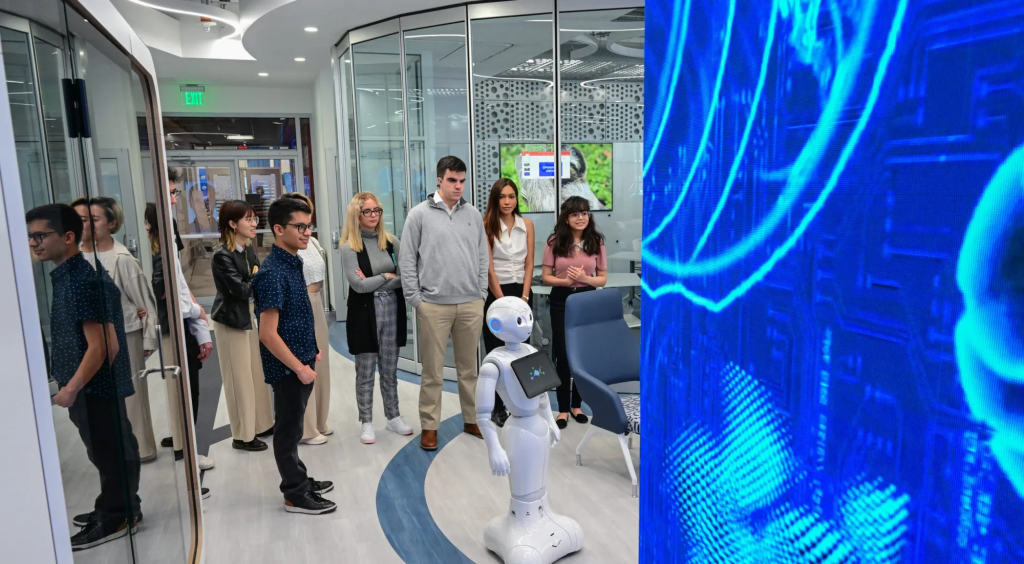AI Skills Are Becoming Essential Across All Majors, Not Just Tech

When Christian Vivas enrolled in an artificial intelligence certification program at Miami Dade College, he wasn’t trying to become a software engineer. He was already running a creative media studio in South Florida and had been using ChatGPT to help write emails. But as he dove deeper into the coursework, he realized AI could do much more—generate videos, produce marketing strategies, craft social media posts, and even build visual content. Now, he uses AI tools in nearly every corner of his business.
Vivas isn’t alone. His classmates were mostly professionals—working adults from all industries—who were eager to learn how to use artificial intelligence effectively in their fields. AI, once seen as the domain of data scientists and engineers, is now being integrated into everyday roles across healthcare, hospitality, marketing, and education.
This shift has created a growing demand for college students and job seekers to develop AI fluency. But there’s a catch: the pace of technological change is fast, and higher education is struggling to keep up.
Across the country, colleges and universities are launching certificate programs, adding AI modules to existing courses, and rethinking assignments altogether. Miami Dade College was among the first to act, debuting an AI certificate program in early 2023—just over a month after ChatGPT was introduced to the public. Since then, the school has expanded its offerings to include associate and bachelor’s degrees in applied AI.
“We didn’t want AI education to be limited to master’s and Ph.D. programs,” said Antonio Delgado, vice president of innovation and technology partnerships at Miami Dade. “We wanted a model that’s accessible to everyone.”
That accessibility is increasingly important as AI reshapes the labor market. Employers aren’t just hiring computer scientists—they’re looking for candidates across departments who can use AI tools to improve efficiency, create content, and analyze data. A 2024 report by labor analytics firm Lightcast found that job postings mentioning generative AI grew more than 300% in just one year. Meanwhile, a World Economic Forum survey showed that 77% of employers plan to train staff to work with AI, even as 41% anticipate reducing overall headcount due to automation.
These trends are already affecting graduates. Entry-level jobs are particularly vulnerable to AI-driven disruption, and the unemployment rate for recent college graduates jumped to nearly 6% this spring, according to the Federal Reserve Bank of New York.
For professionals like Vicky Cheung, who lost her job at a Miami hospital after two decades, upskilling with AI proved to be a career lifeline. After completing an AI awareness certificate program, she landed a new job at a different hospital, where she now works on optimizing workflows and improving internal systems. “It showed that I was actively trying to grow my skill set,” she said.
Some employers are also pushing their teams to explore how AI can support everyday operations. A luxury hotel in South Florida, for example, tasked every department with identifying potential AI use cases. One team created a chatbot to help guests find local restaurants. Another is using automation to streamline back-office tasks.
These real-world applications are prompting colleges to rethink how and what they teach. Derrick Anderson, who teaches public affairs at Arizona State University and also serves as a senior vice president at the American Council on Education, redesigned parts of his course to reflect how AI is used in the workplace. He no longer asks students to write a single final paper. Instead, they must produce a video using AI tools like ChatGPT and demonstrate how it could be used in a professional setting.
One student created a narrated video that visually explained how new brain-inspired technology might revolutionize computing. Another used ChatGPT to draft multiple versions of workplace memos for different scenarios. “It’s a fundamentally different exercise,” Anderson said. “The volume of content you can now create is higher, so the expectations rise as well.”
For some faculty, the challenge is maintaining a balance between embracing AI and preserving traditional learning goals. James Taylor, a philosophy professor at The College of New Jersey, still requires students to write essays by hand in class. While he supports AI literacy, he’s cautious about its impact on critical thinking. “We’re trying to teach students how to form and evaluate arguments,” he said. “If AI does that for them, they miss the point.”
The lack of standardized credentials is another issue. Right now, employers like eMed, a digital healthcare company, rely on job candidates to show real-world examples—portfolio pieces, class projects, and freelance work—rather than official certificates. Ken Finneran, eMed’s VP of HR, said that every department at his company uses AI tools, and those who embrace the technology are quickly outperforming their peers. “The person using AI isn’t just faster,” he said. “They’re better.”
For workers worried about AI replacing them, Vivas has a simple outlook: “It’s not that AI is going to replace people. It’s that people using AI are going to replace the ones who aren’t.”
As more colleges invest in AI-related education and employers set new expectations for their workforce, one thing is becoming clear: artificial intelligence isn’t just for tech majors anymore. It’s becoming a fundamental skill across every profession.

